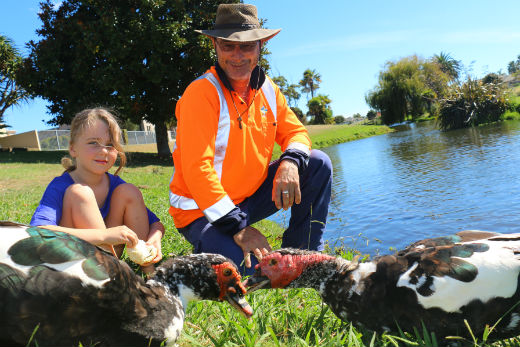Tauranga City's duck population is diminishing as high temperatures and warm waterways aid in the spread of a toxic botulism, currently killing about five ducks a week.
Sophie Alderton, 7, and Tauranga City Council drainage engineer Peter Moro look at the ducks at the Royal Palm Beach Reserve in Papamoa.
For the last three months Tauranga City Council, the Department of Conservation and Fish and Game New Zealand have been retrieving dead or sick ducks from Papamoa's Royal Palm Beach Reserve as concentrated levels of the toxin remain in low water levels.
Tauranga City Council drainage engineer Peter Moro says the northern side of the reserve, the exit to Harrisons Cut, is being monitored daily.
Resident Muscovy and Mallard ducks at the reserve are being checked for any symptoms commonly associated with the toxin. Symptoms include drowsiness, and a 'floppy and loose neck”.
'If they are in the water when that happens they basically hang their head and they can drown. I'm not actually sure what actually kills them from botulism, but quite often it is just by downing,” says Peter.
'It makes them all floppy and lucid, like their drunk - then they just hang their head.”
Botulism is a rare and potentially fatal paralytic illness caused by a toxin produced by the bacteria Clostridium botulinum. Every year, many ducks are paralysed or die after being exposed to the toxin that attacks the nervous system.
Duck's eyelids droop as the inner eyelid becomes paralysed and eventually, the neck goes limp. At this point, ducks drown due to the inability to hold their heads above water. Affected ducks that do not drown die of respiratory failure.
Humans, cats, and dogs are generally not affected.
Pete says despite the poisoning being confined to one area, council is unable to fully prevent the concentrated botulism levels or ducks landing on the water.
Botulism Type C spores exist in lake and pond bottoms and thrive when air temperatures rise and water and oxygen levels drop. A hot dry summer increases the probability of outbreaks and as water levels drop, the bacteria are exposed.
'It's always present there, but it's obviously getting into something the ducks are feeding on. The only thing we can do is keep them off the water but that's a bit hard.
'It's a matter of the water being refreshed and having a lot more fresh water there and the ducks can still eat what they are eating with the botulism in it. The waterway is very low, lower than the outlet at the moment and it's pretty much evaporating.”
Ducks suffering from botulism can be saved if properly cared for. Fresh water is the most helpful rehabilitator.



5 comments
.
Posted on 08-04-2014 13:00 | By whatsinaname
botulism can be spread to humans and other animals. get RID of the ducks.....
I'm Confused!!!
Posted on 08-04-2014 13:19 | By lpm67
Humans, cats, and dogs are generally not affected. What does genrally not affected mean? Are we at risk or not, should people take care to protect their poultry from this spore? Can it be transmitted via Fowl droppings, because this would affect backyard chickens! Could we please have more information from the council on the true risks?
Love ducks
Posted on 08-04-2014 14:10 | By panda
So they'll save the ducks if they are properly cared for? Great, but......just in time for the upcoming duck shoot season? That's absurd. If you care about saving the ducks then save ALL the ducks and scrap the duck shoot.
Ducks
Posted on 09-04-2014 07:58 | By mikecooper43@clear.net.nz
They need culling any way.
Typical
Posted on 14-04-2014 15:44 | By lpm67
No updates from the council re: healthrisk
Leave a Comment
You must be logged in to make a comment.